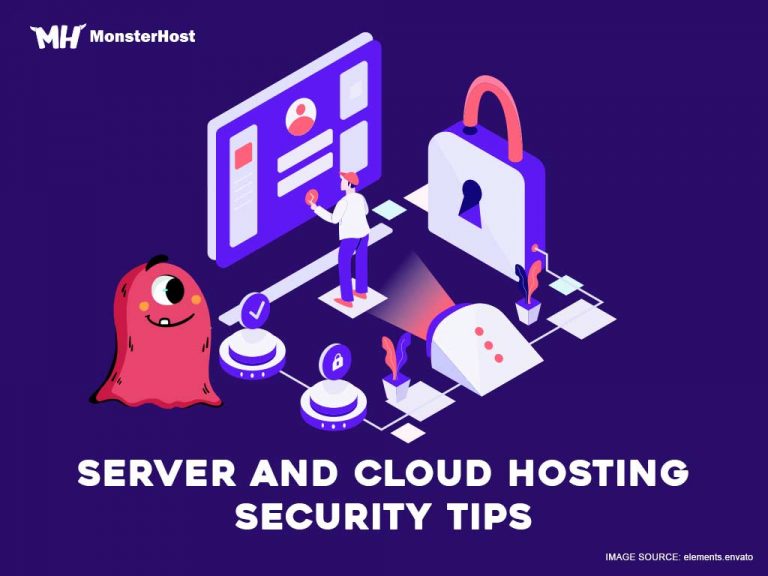Most businesses don’t have the capital to store their data on their own servers. Not only are the servers themselves expensive, but they also attract other costs, like hiring additional staff to maintain the servers and some more staff to keep the servers safe. Enter: web hosting, especially cloud hosting and secure dedicated server hosting.
Cloud hosting and secure dedicated server hosting cost less, require less maintenance, and are more secure than hosting your website on your own.
Table of Contents
Security benefits of cloud hosting
Cloud hosting’s been getting a bad rap lately, so if you’re not familiar with the multitude of reasons why it’s a superior way to store your data, you might be wondering why millions of businesses are still entrusting their data to the cloud. Here are just a few reasons:
Multiple server options: Usually, your website is stored on only one server. If something happens to the hardware of that server, your site will go down until someone fixes it.
If your website is stored on the cloud, this doesn’t happen. Your site will just be loaded from a different virtual server.
Website mirroring: If something happens to your site, an identical version (stored on the cloud) is loaded in its place.
Less strain on server resources: Cloud hosting makes it easier to spread resource requirements across different servers, which means no single server is overburdened.
Even with all of that, cloud hosting and secure dedicated hosting aren’t perfect; they’re just the best of the available options.
So, how do you keep your data safe?
8 Cloud Hosting Security Tips
1. Choose the right host
2. Enable encryption
3. Use strong passwords
4. Enable two-factor authentication
5. Back everything up
6. Manage user access
7. Other people’s devices are your weakest link
8. Make sure you understand who’s responsible for what
1. Choose the right host
Naturally, the most important thing you can do to make sure you have secure dedicated hosting is to choose the right host – a monster host.
Choose a web host that cares as much about your website’s safety as you do.
And make sure you choose the right hosting option. Many businesses find that their needs are best met by VPS hosting (or Virtual Private Server) hosting.
VPS hosting has the security of secure dedicated hosting, but for a lower price.
Also, choose a web host that offers cPanel, like we include with all our packages and for a small fee with our VPS and dedicated server hosting packages.
cPanel takes the guesswork out of running your website, because it has a graphical interface. The more control you have over managing your website, the more control you have over its security. That’s why it’s something to look for when you’re choosing a monster hosting company.
But even with monster hosting, there are still seven more important security tips you should follow:
2. Enable encryption
Even if your cloud hosting provider automatically encrypts your data when it’s uploaded to the cloud, it can’t hurt to encrypt your data even before you upload any files onto the cloud. This is especially vital if your website collects sensitive data.
Ask your hosting provider if you’re not sure how to go about applying this step. (We have 24/7 customer support!)
3. Use strong passwords
This should go without saying, but you’d be surprised if we told you how many people still have weak, easily guessed passwords. (Unfortunately, writing your child’s name backwards doesn’t count as a strong password.)
The best passwords are those that are randomly generated or that appear to be randomly generated but actually make perfect sense to you. Use a combination of upper- and lowercase letters, and add numbers and symbols.
Also, make sure you replace your password at regular intervals. There’s usually no need to go overboard with this. For most people, every six months is fine. But if your website collects sensitive, confidential data, you might want to increase this to every three months.
4. Enable two-factor authentication
Two-factor authentication is a type of Multi-Factor Authentication, and it just means your system won’t grant you access unless you can provide two pieces of evidence that you’re actually authorised to access it.
This means that instead of being granted access after entering only the correct password, you’ll also be required to do one other thing, kind of the way you have to swipe the correct card and enter the correct PIN to withdraw money from an ATM.
5. Back everything up
Most cloud hosting providers will already back up your data, but even if you’ve chosen monster hosting, used a strong password and enabled two-factor authentication, it couldn’t hurt to back up your data.
To be on the safe side, store crucial data in multiple secure places (emphasis on secure).
6. Manage user access
Everybody with access to your data should know exactly how to keep it safe. No matter how many steps you take to secure your data, it could all be undermined by a hapless employee who uses unsecured Wi-Fi to access your data in the cloud. So, train your employees on how to keep your data safe. It’s also not a bad idea to conduct regular anti-phishing training for anybody you plan to put in charge of your data.
In a similar vein, try not to give too many people access to your data. This leads to our next tip:
7. Other people’s devices are your weakest link
Sometimes it’s necessary to allow your employees to access your data on their own devices. But most people don’t secure their personal devices as highly as you secure your company devices. if you do allow employees to access your data on their devices, make sure IT has access to them, so they can be remotely wiped in case they’re compromised.
8. Make sure you understand who’s responsible for what
Some aspects of keeping your data secure will be in the control of your hosting company. But other aspects might be your responsibility.
Be very clear on who’s responsible for various aspects of data security. You don’t want to leave anything unguarded because you thought your hosting provider would be taking care of it.
These things can vary from company to company and even from plan to plan within the same company, so read your user agreement carefully, and if you’re not sure about something, ask.
What’s the takeaway from all this?
Even though cloud hosting and secure dedicated server hosting are great ways to keep your data safe, they’re not impenetrable. And you’ll be the one who’ll suffer the harshest consequences if anything does go wrong.
So, even if you do choose a monster host, you can’t afford to just leave your security in the hands of your hosting providers. Take these eight steps to make sure your data is safe, no matter where you store it.






